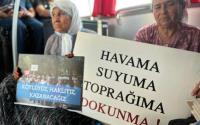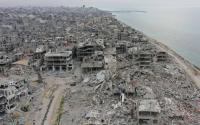5 August 2005Guardian
So another blast and, a month or so later, another tape. This time it is Ayman al-Zawahiri, the Egyptian militant who has been the professional partner of Osama bin Laden for the best part of 15 years, who has surfaced on our screens.
The iconography is relatively easy to decode. The gun to his right is a more potent looking weapon than usual, with a grenade launcher fixed to its barrel, indicating a desire to reinforce the threat of violence. The black turban like that worn by the Taliban suggests a concern to show solidarity with the rump of the movement still fighting, just about, in Afghanistan.
The white robes are fairly standard but, combined with the long white beard and the military props, indicate a warrior-statesman or a fighting cleric, an archetype familiar to anyone with an interest in Islamic political history.
Al-Zawahiri is not saying much that is new. The London bombs are an opportunity to restate what is, with certain variations, the standard Islamist extremist argument: that the west is oppressing Muslims around the world, America and its allies are set on the humiliation, subordination and division of the lands of Islam and that this justifies self-defence by many different means, including suicide bombing.
The only real difference with what has gone before is the explicit focus on the UK. This does not indicate any direct link with the London bombs. Whenever there has been an attack there has been a knee-jerk search for overseas links or for some kind of overall mastermind. No investigations into the London bombs, or indeed into almost all of those attacks committed in recent years, have revealed any such connections.
Instead, we need to face up to the simple truth that Bin Laden, al-Zawahiri et al do not need to organise attacks directly. They merely need to wait for the message they have spread around the world to inspire others. Al-Qaida is now an idea, not an organisation.
The focus on the UK might also concentrate the minds of those in government who, in the face of all evidence to the contrary, deny a link between the attacks and Britain's role in Iraq.
The UK has rapidly ascended the list of preferred jihadi targets in the past two years. A threat against the UK existed before 2003, but our involvement in Iraq made it very much worse.
Propaganda (and we should remember the origins of the word in the faith campaigns of the counter-reformation Catholic church) has always been the mainstay of al-Zawahiri's, and thus al-Qaida's, strategy.
Al-Zawahiri is only a little older than Bin Laden but, when the two met in Pakistan in the late 1980s, he was a far more experienced militant. He had been imprisoned and tortured in his native Egypt and had thought deeply about the tactics that would bring a militant group success. He recognised that activists were a minority, and, in a way that would be familiar to many revolutionary leftists, blamed the "false consciousness" of the Egyptian masses for their failure to rise up.
Ten years later, al-Zawahiri's horizons had broadened and he, along with Bin Laden, was now interested in radicalising and mobilising a bigger community: the ummah, or global nation of Islam.
The terrorist attacks organised directly by al-Qaida, most of which took place between 1998 and 2002, had two aims. One was wounding the enemy, America and its allies, but another, equally important, was to use carefully choreographed acts to impress, amaze and inspire those in the Islamic world who had yet to heed the call to arms.
In a book published in 2002, al-Zawahiri laid out his aims. "We must mobilise the nation in the battle of Islam against unbelief ... We caution against the risk of Muslim vanguards being killed in silence."
The bombers of Madrid, Casablanca, Istanbul, Riyadh and now London have heeded that call. We now have a situation where autonomous cells carry out attacks on targets and at times of their own choosing, which are then applauded by al-Qaida leaders of global infamy but limited practical ability to execute or organise strikes. This is exactly as al-Zawahiri and Bin Laden had hoped. This is a virtual terrorist network, not a real one.
In 2001, Bin Laden said his "life or death did not matter" because "the awakening has started".
There may have been no mass uprising in the Islamic world, something that is due to the sense and humanity of the vast bulk of the world's 1.3 billion Muslims rather than any counter-terrorist strategy pursued by the west, but there are an increasing number of angry people who have answered the call.
Al-Zawahiri portrayed himself as a warrior and a statesman in the video broadcast yesterday. He did not need any props to demonstrate his extraordinary gift for media manipulation.
· Jason Burke is chief reporter of the Observer and the author of Al-Qaeda: The True Story of Radical Islam






